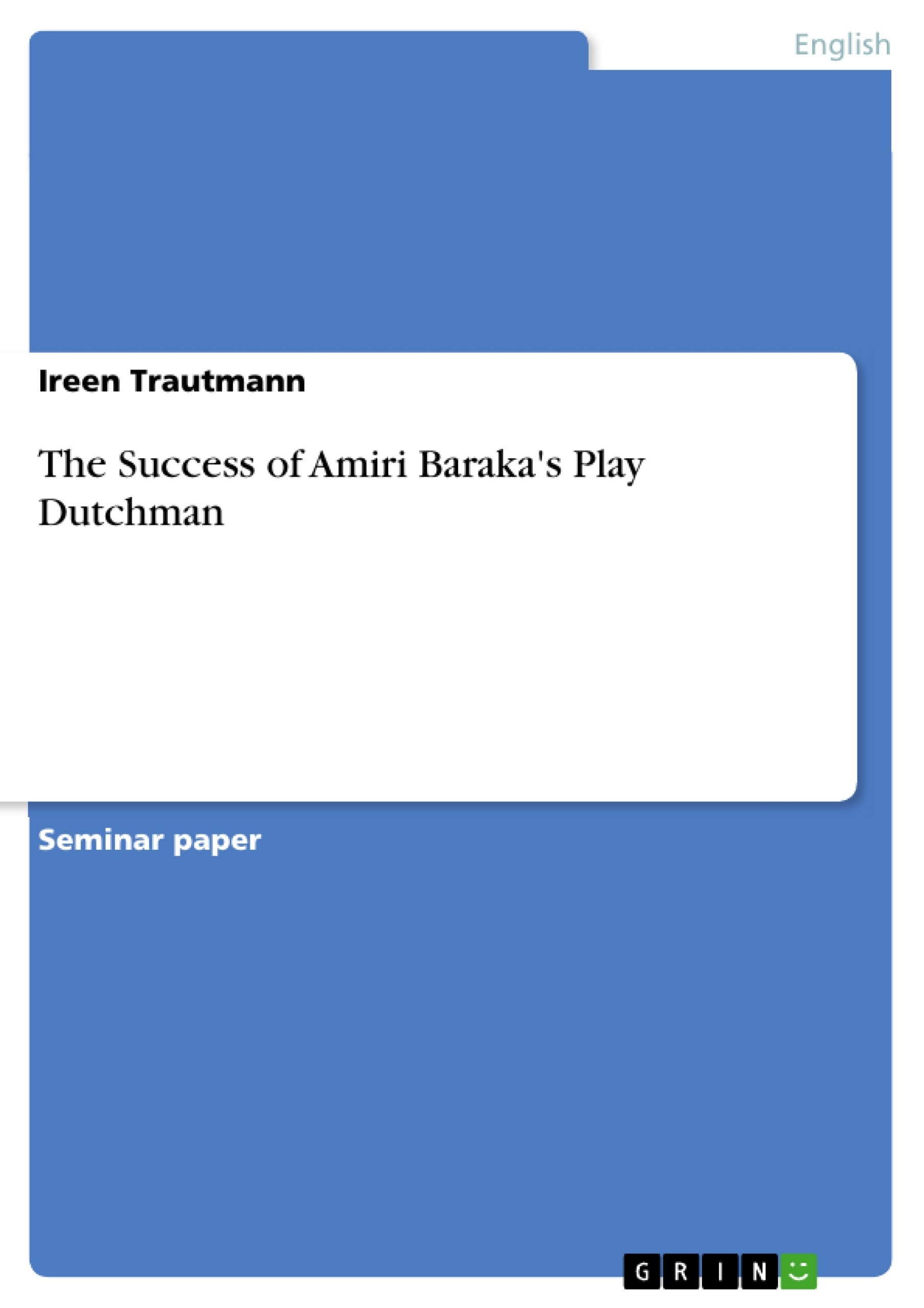Dutchman was first presented at the Cherry Lane Theatre in New York in 1964. As the best Off-Broadway Play it gained an Obie-Award the same year and was made into a film in 1967 which made it widely known.2 Later, Dutchman was internationally successful because of being produced and performed in other metropolises like Paris, Berlin and Spoleto (Italy). Being Baraka’s most widely acclaimed play, which is often regarded as his break through and the break through of African American theatre, it convinces up to now and gives occasion for discussions about its intentions and its historical background. It is titled as […] a triumph of stagecraft, a model two-acter whose economy and handling of pace and denouement were not to be doubted.3
Although the play was generally well received4, it provoked critical controversy amongst its audience as well5. Dutchman was performed for a dual audience. Initially, it played to primarily white audiences until Baraka moved it to the black audiences of Harlem6. For both, it was something new: The white audience was confronted with a new type of black man because up to now they had just known the nigger minstrel who was harmless and acceptable to them because he was de-sexed, trapped in a role which combined self-mockery with an endearing musicality7. The Negro is not presented as a primitive African savage8 anymore. For the black people, precisely for the black non-reading audiences of the lower classes, it was the first time to be confronted with theatre.
Table of Contents
- Introduction: the first presentation of the play and the audience's reactions
- Reasons for its success
- The complexity of themes
- The representation of the situation of the blacks in the 1960s.
- The representation of gender and class issues.
- Its revolutionary character
- The appeal to a new black consciousness
- The appeal to society on the whole
- The effect of authenticity
- The autobiographical line
- Its symbolism
- The complexity of themes
- Summary and conclusion
Objectives and Key Themes
This research paper examines the reasons for the success of Amiri Baraka's play Dutchman, which premiered in 1964 and quickly gained recognition and acclaim. The paper explores the play's historical context, its revolutionary nature, and the various themes it addresses, including the complexities of race, gender, and class in 1960s America.
- The historical context of African American identity and the Civil Rights movement.
- The portrayal of racial tensions and the struggle for black empowerment.
- The play's innovative form and departure from traditional theatre conventions.
- The exploration of gender roles and the intersection of race and sexuality.
- The influence of personal experience and the autobiographical elements within the play.
Chapter Summaries
- Introduction: This chapter introduces Dutchman, its initial reception, and its impact on both black and white audiences. It highlights the play's departure from traditional representations of black characters and its exploration of a new black consciousness.
- Reasons for its success: This section examines the play's success by focusing on its complex themes, revolutionary character, and its appeal to both black and white audiences. It also discusses the play's use of symbolism and its autobiographical elements.
- The complexity of themes: This chapter delves into the various themes addressed in Dutchman, including racial betrayal, anti-racist sentiments, black consciousness-raising, and the intersection of gender and class issues.
- The representation of the situation of the blacks in the 1960s: This section analyzes the play's portrayal of the realities faced by African Americans in the 1960s, highlighting the choices between assimilation and revolt, and the struggle for identity.
Keywords
The key themes and concepts explored in this work include: African American theatre, Amiri Baraka (formerly LeRoi Jones), 1960s America, racial identity, black consciousness, gender and class issues, revolution, and the intersection of personal experience and social commentary.
- Quote paper
- Ireen Trautmann (Author), 2006, The Success of Amiri Baraka's Play Dutchman, Munich, GRIN Verlag, https://www.grin.com/document/73551




